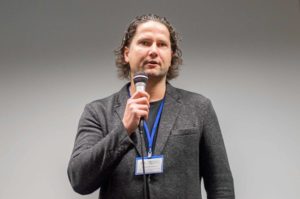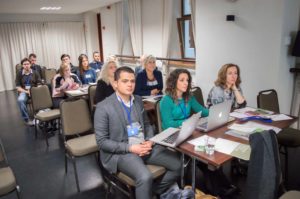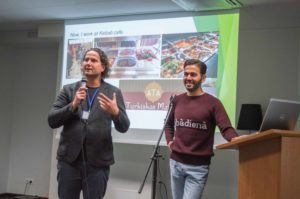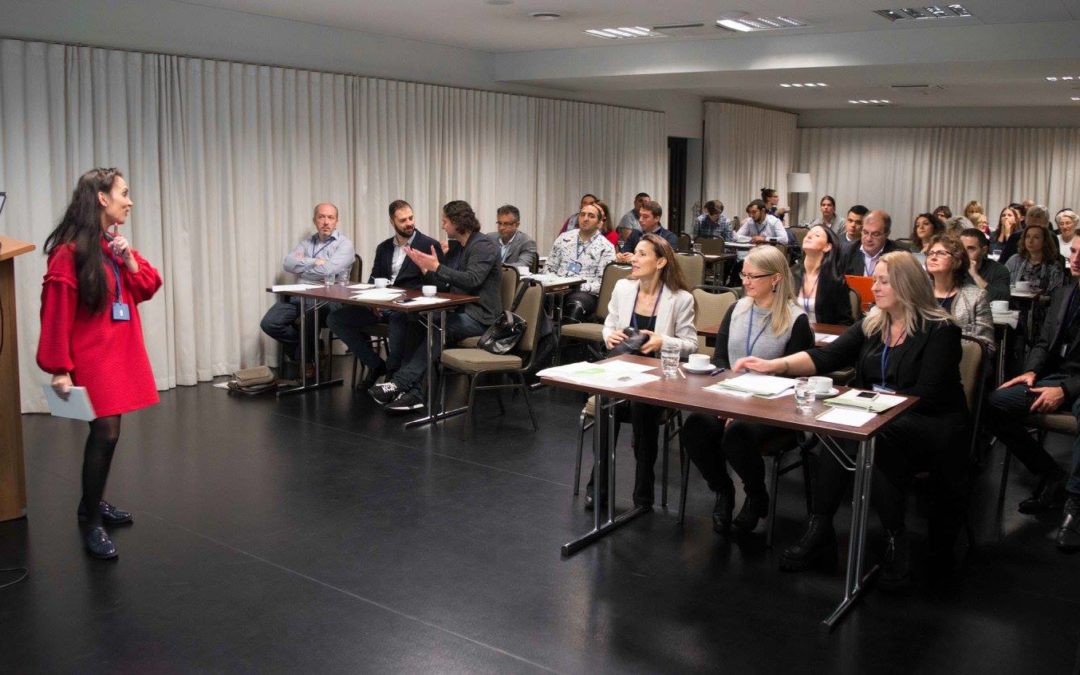 On the 11th of November, two collaborators of the UNESCO Chair, Ing. Kevin Ramirez and Serena Montefusco participated to the third EUROSOL event in Vilnius, Lithuania. Vilnius Business College, one of the seven partners of EUROSOL project co-funded by the European Union, organized a conference, Active Society – Innovative Solutions (ASIS-2017) with the aim of raising awareness on migration and increasing solidarity among European citizens. During the entire day, several topics based on migration, integration, and migrants’ rights were presented. For example, Dr. Stefanos Spaneas of University of Nicosia, Cyprus, gave a speech on European regulations and laws from an historical perspective. It was interesting to see how European law is developing to ameliorate the situation of migrants and refugees; however, as Dr. Spaneas argued, the asylum and migration policy is still far to be implemented in favor of a regular and legal migration. Then Dr. Stefanos Spaneas left the podium to another EURSOL partner, Nathan James Ward of Diagrama Foundation, UK, who shared his idea of migration compared to English birds’ migration with the colleagues of Vilnius.
On the 11th of November, two collaborators of the UNESCO Chair, Ing. Kevin Ramirez and Serena Montefusco participated to the third EUROSOL event in Vilnius, Lithuania. Vilnius Business College, one of the seven partners of EUROSOL project co-funded by the European Union, organized a conference, Active Society – Innovative Solutions (ASIS-2017) with the aim of raising awareness on migration and increasing solidarity among European citizens. During the entire day, several topics based on migration, integration, and migrants’ rights were presented. For example, Dr. Stefanos Spaneas of University of Nicosia, Cyprus, gave a speech on European regulations and laws from an historical perspective. It was interesting to see how European law is developing to ameliorate the situation of migrants and refugees; however, as Dr. Spaneas argued, the asylum and migration policy is still far to be implemented in favor of a regular and legal migration. Then Dr. Stefanos Spaneas left the podium to another EURSOL partner, Nathan James Ward of Diagrama Foundation, UK, who shared his idea of migration compared to English birds’ migration with the colleagues of Vilnius.
 Moving on, the Associate Professor, Dr. Thomas Butvilas of the Vilnius Business College, Vilnius, introduced his topic on children who are left behind. He stressed the importance of assisting and supporting children during stressful and painful moments that may occur in their lives. Cases of abandonment and physical or psychological violence, are typical of unaccompanied migrant minors. These minors are usually sent or sold by their parents to leave their country of origin to have a better future. However, reality does not always meet the expectations. The intentions might be good, but the acts leave a lot of wounds.
Moving on, the Associate Professor, Dr. Thomas Butvilas of the Vilnius Business College, Vilnius, introduced his topic on children who are left behind. He stressed the importance of assisting and supporting children during stressful and painful moments that may occur in their lives. Cases of abandonment and physical or psychological violence, are typical of unaccompanied migrant minors. These minors are usually sent or sold by their parents to leave their country of origin to have a better future. However, reality does not always meet the expectations. The intentions might be good, but the acts leave a lot of wounds.
The second part of the morning session was more focused on social inclusion and innovative actions. For example, Egle Dosiene presented an NGO, Blessed Jurgis Matulatis Social Center. She explained the social activities, most of them cleaning activities, that she and a group of young people lead in a neighborhood of Vilnius, in order to have an active population and more sensitive to the migration issue. Moreover, Vaidesvarans Sundars of School of Business Administration Turiba, Latvia, presented the program Erasmus Plus to show how diversity is important in an educational environment.
 After a typical Lithuanian lunch at Amberton Hotel, the discussion continued focusing on labor market and its challenges. Kristina Kovaite, for instance, started by pointing out that often migrants are seen as the ones who steal jobs in the host countries. She offered an alternative vision arguing that labor market will change because of the Industry 4.0. In other words, she claimed that artificial intelligence will be the real threat.
After a typical Lithuanian lunch at Amberton Hotel, the discussion continued focusing on labor market and its challenges. Kristina Kovaite, for instance, started by pointing out that often migrants are seen as the ones who steal jobs in the host countries. She offered an alternative vision arguing that labor market will change because of the Industry 4.0. In other words, she claimed that artificial intelligence will be the real threat.
 The panel discussion ended with two testimonies of two young men, Nanko Nikolai Todorov from Bulgaria, and, Elvin Jafarov from Azerbaijan, who shared their successful lives in Vilnius. Mr. Todorov owns his company of children’s clothing and Mr. Jafarov has his own Kebab and cafeteria. Gathering speakers and participants from fourteen countries, it was possible to have a diverse discussion and dialogue on EU integration and migrants’ rights. The UNESCO Chair being present to this discussion continues to pursue its mission of cooperation and global ethics increasing its sense of dialogue and investigation on human rights, multiculturalism, interreligious dialogue, and technology. Moreover, the UNESCO Chair representatives had the possibility to share with the other partners the program of their EUROSOL event that will be held on 27th of November in Rome.
The panel discussion ended with two testimonies of two young men, Nanko Nikolai Todorov from Bulgaria, and, Elvin Jafarov from Azerbaijan, who shared their successful lives in Vilnius. Mr. Todorov owns his company of children’s clothing and Mr. Jafarov has his own Kebab and cafeteria. Gathering speakers and participants from fourteen countries, it was possible to have a diverse discussion and dialogue on EU integration and migrants’ rights. The UNESCO Chair being present to this discussion continues to pursue its mission of cooperation and global ethics increasing its sense of dialogue and investigation on human rights, multiculturalism, interreligious dialogue, and technology. Moreover, the UNESCO Chair representatives had the possibility to share with the other partners the program of their EUROSOL event that will be held on 27th of November in Rome.

